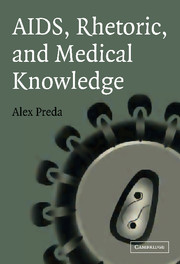Book contents
- Frontmatter
- Contents
- Acknowledgments
- List of Abbreviations
- Introduction
- 1 Making Up the Rules of Seeing
- 2 The Economy of Risk Categories
- 3 The Etiologic Agent and the Rhetoric of Scientific Debate
- 4 Retrovirus vs. Retrovirus
- 5 The Spatial Configurations of “AIDS Risk”
- 6 Who Is How Much?
- 7 In Lieu of a Conclusion
- References
- Index
Introduction
AIDS and Scientific Knowledge
Published online by Cambridge University Press: 25 July 2009
- Frontmatter
- Contents
- Acknowledgments
- List of Abbreviations
- Introduction
- 1 Making Up the Rules of Seeing
- 2 The Economy of Risk Categories
- 3 The Etiologic Agent and the Rhetoric of Scientific Debate
- 4 Retrovirus vs. Retrovirus
- 5 The Spatial Configurations of “AIDS Risk”
- 6 Who Is How Much?
- 7 In Lieu of a Conclusion
- References
- Index
Summary
Brightly colored condoms, arranged in the shape of bicycles, eyeglasses, or flowers: part of an extensive campaign against the AIDS risk, these have been a common sight on billboards in Germany for several years now. An advertising spot presented on the Arte television channel (which defines itself as the cultural television channel of Europe) calls on viewers to “fight together.” The spots on German television (distributed by both private and public channels) are about “not giving AIDS a chance.” At the beginning of December, the major television and radio stations, advertising companies, and the press reminded the public not only about Christmas and family values, but also about risks, being safe, and not giving viruses any chance to spread. Since December 1st was declared World AIDS Day, the AIDS risk has been featured regularly in the media in the pre-Christmas period. Not that this topic is completely absent from the media in the first eleven months of the year; in fact, the opposite is true. The activities around December 1st are simply an extra reminder to be vigilant, keep up the fight, and not give this deadly enemy any opportunity. And fight it the populace must because these risks seem now to be almost everywhere.
The media have alerted people to “contamination risk,” “occupational risk,” “technological risk,” and “Third World risk.”
- Type
- Chapter
- Information
- AIDS, Rhetoric, and Medical Knowledge , pp. 1 - 44Publisher: Cambridge University PressPrint publication year: 2004
- 1
- Cited by



